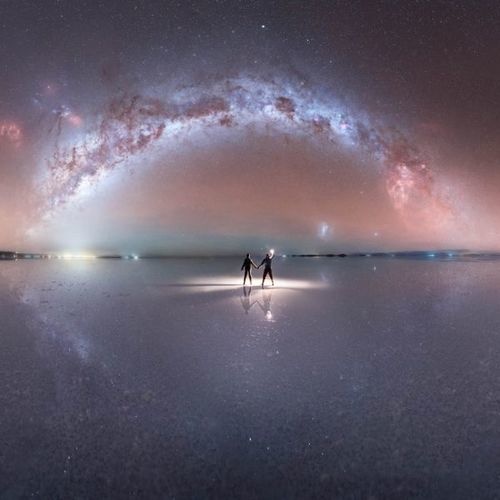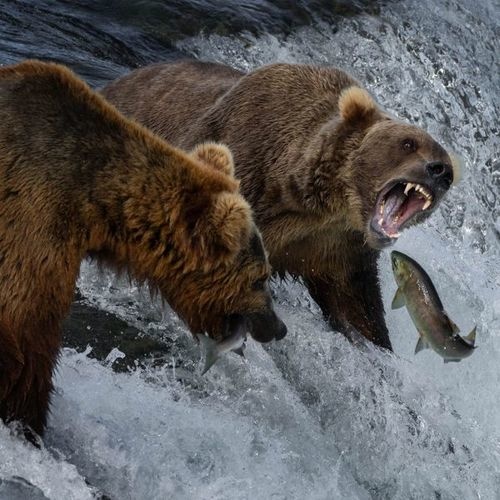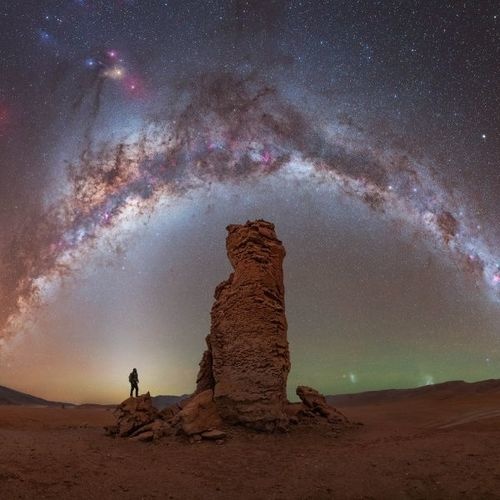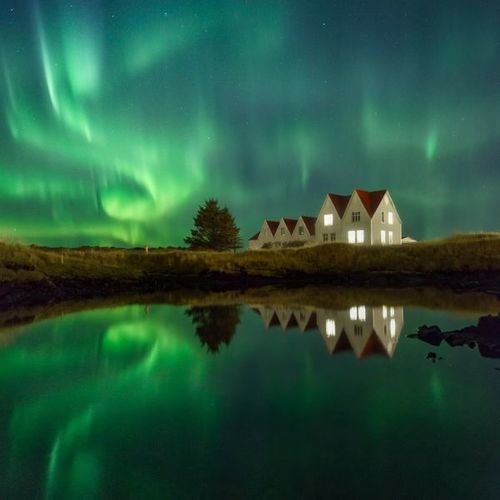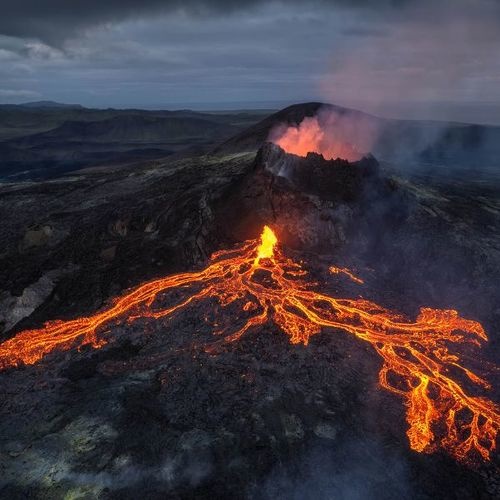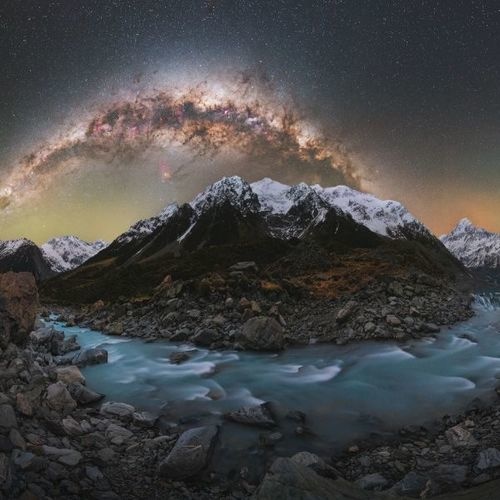The 2022 Northern Lights photographer of the year
Photographing the Northern Lights is a thrilling experience.
There aren’t many events as moving as seeing the aurora borealis dance and illuminate the night sky with mesmerizing movements and vibrant colors.
To help you find inspiration for planning and executing your images, in this new edition of the Northern Lights Photographer of the Year, we present the 25 best aurora images captured around the world.
Buckle up because this trip is going to take you from the remote boreal forests of the Arctic to the far landscapes of the Southern Hemisphere, passing by spectacular lakes, mountains, and beaches along the way…always with the Northern Lights dancing in the sky.
“Polaris Dream” – Nico Rinaldi
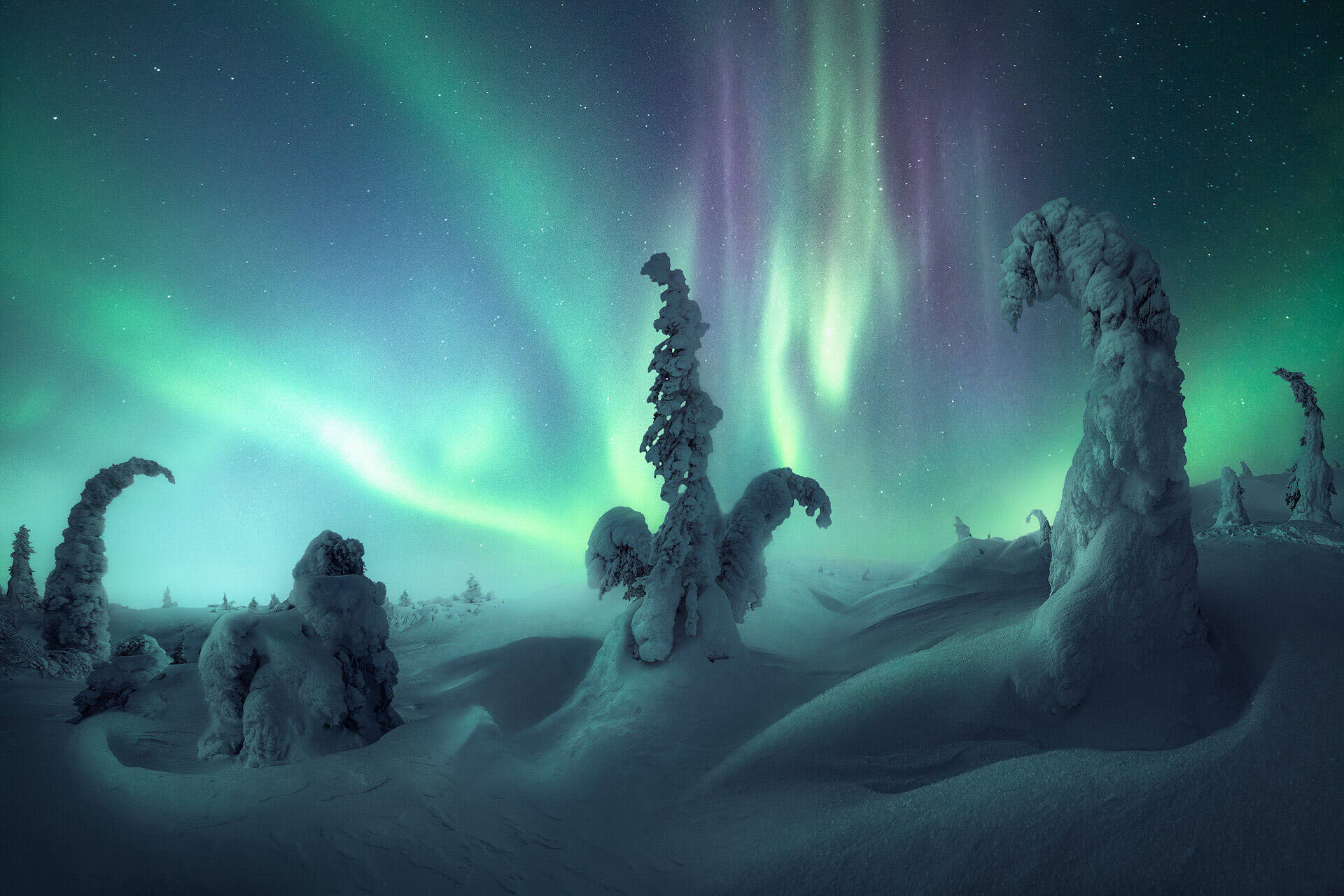
“Polaris Dream” – Nico Rinaldi
- Murmansk Oblast, Russia
I had dreamed about photographing the landscapes of Northern Russia for a long time, and this year it came true! There, you feel like you’re in the realm of snow monsters, in a landscape where the mountains and trees are dominated by ice and snow. That night, the Northern Lights put on an incredible show!
It was hard work to get to this place, since exploring this location and organizing logistics required a lot of time, effort, and the help of the friendly locals we found in our path. I only hope we can see the peace reestablished soon and re-connect with so many incredible people and landscapes on this planet.
Sky: 6 sec, ISO 4.000, f/2.8, 14mm
Foreground: 180 sec, ISO 800, f/4, 14mm
“Auroraverse” – Tor-Ivar Næess
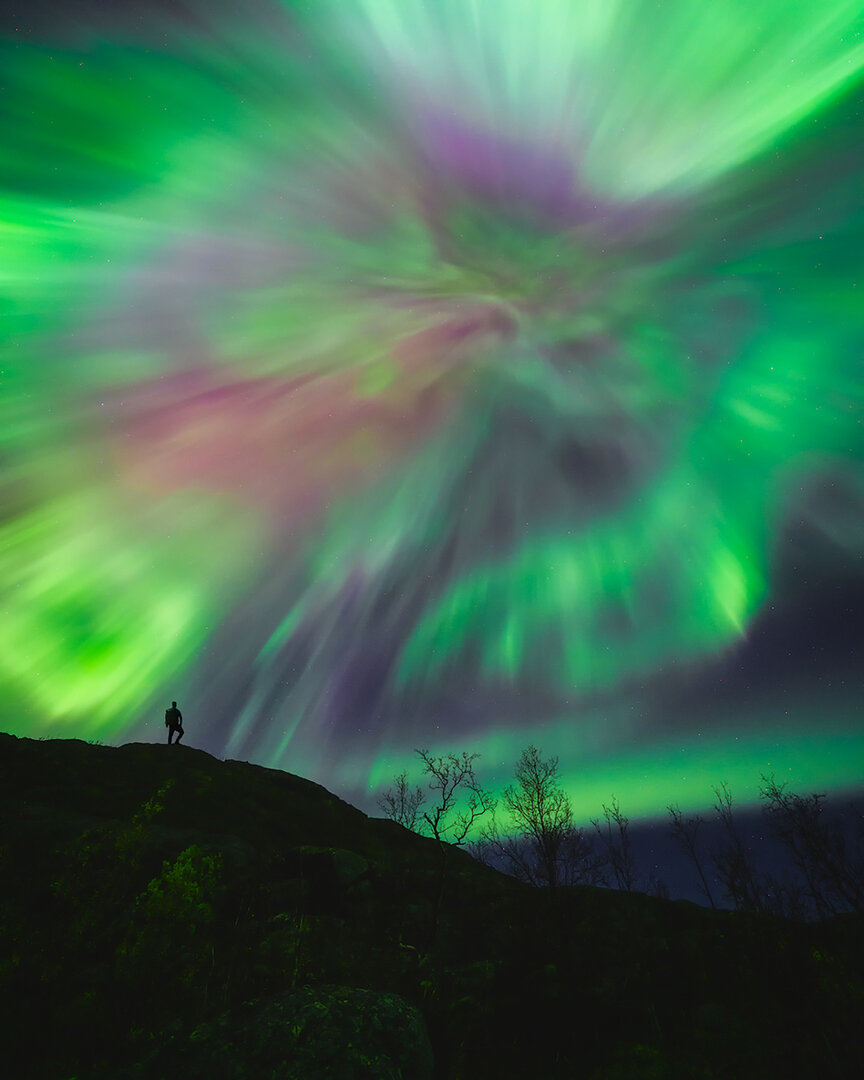
“Auroraverse” – Tor-Ivar Næss
- Nordreisa, Norway
When the Northern Lights go crazy in the night sky, focusing on your composition is worth the utmost effort because there is so much happening so quickly.
Even for a seasoned photographer, it’s very hard to focus on enjoying the Aurora while photographing it.
12mm, 6 sec, f/2.8, ISO5000
“Elves’ House” – Asier López Castro
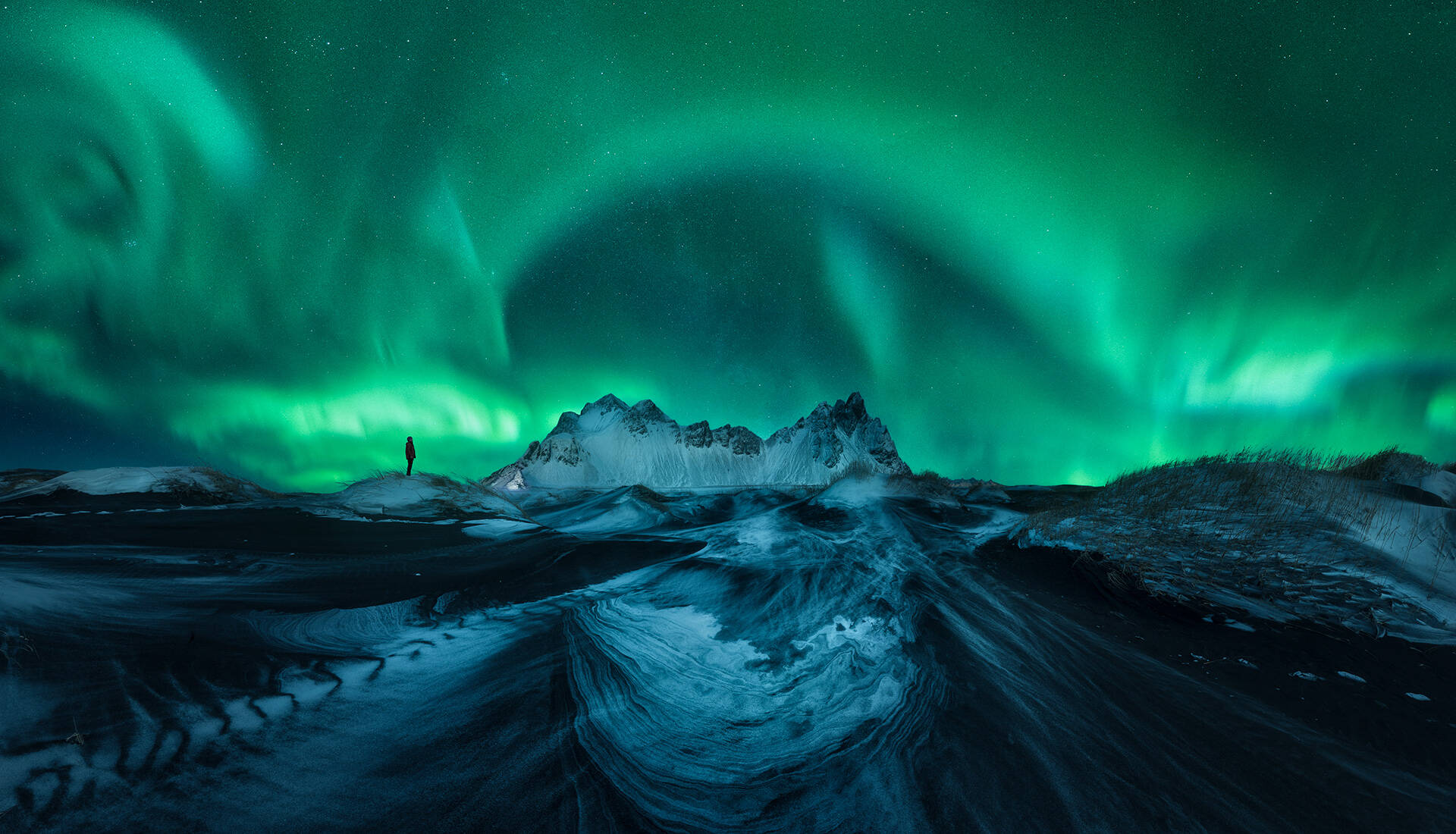
“Elves’ House” – Asier López Castro
- Stokknes, Iceland
On my last trip to Iceland, I decided to try my luck in one of its most iconic locations, a magical place for any landscape photographer.
It snowed the day before, and the air mixed the fallen snow with the fine sand, making the textures on the ground incredibly beautiful. Then the sky did the rest.
The biggest problem in photographing this kind of scene is the limited information you get for the foreground since the exposure times are usually short (between 2 and 10 seconds) in order to capture the shape of the Aurora. That’s why I was forced to take pictures with different settings for the foreground and the sky.
Foreground: F/5.6, 20 secs, ISO 640. 6 shot panorama.
Sky: F/2.8, 4 secs, ISO 3200. 6 shot panorama.
“Nordic Quetzal” – Luis Solano Pochet
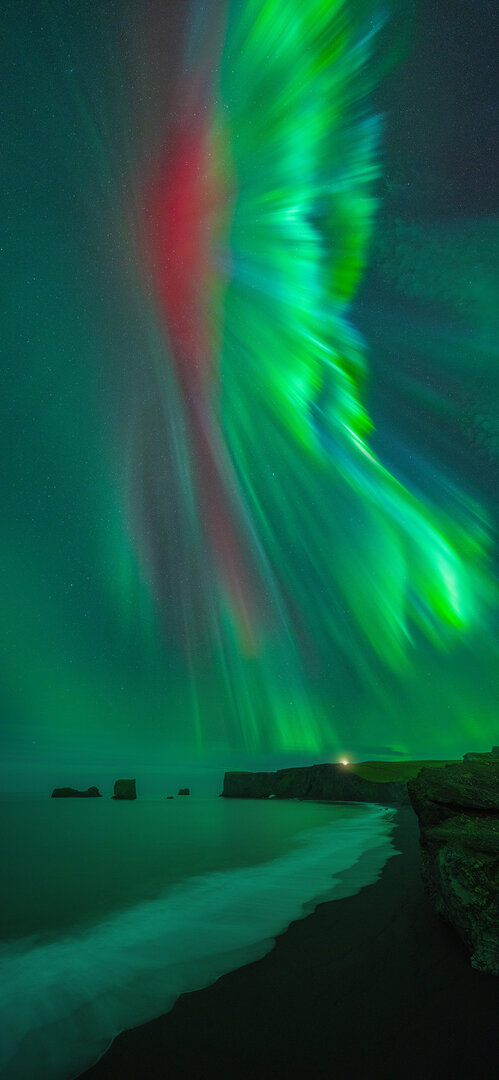
“Nordic Quetzal” – Luis Solano Pochet
- Dyrhólaey, Iceland
This rare red Aurora that shined after a powerful solar event in Iceland reminded me of the iconic tropical bird of my home country: the Quetzal. It was a dream come true!
I had to take a vertical panorama to frame the action since my 14mm lens wasn’t wide enough to capture the grandeur of this Aurora. It was hard to process and edit these images because of how unreal they seemed to me with the unique red color. It made me think of all the myths and legends that this natural phenomenon must have awakened in ancient civilizations. I am grateful to have been there, and I will always carry the experience in my heart.
Aurora: ISO 3200, F1.8, 1.3″
Foreground: ISO 1000, F1.8, 30″
“Under a Northern Sky” – Rachel Jones Ross
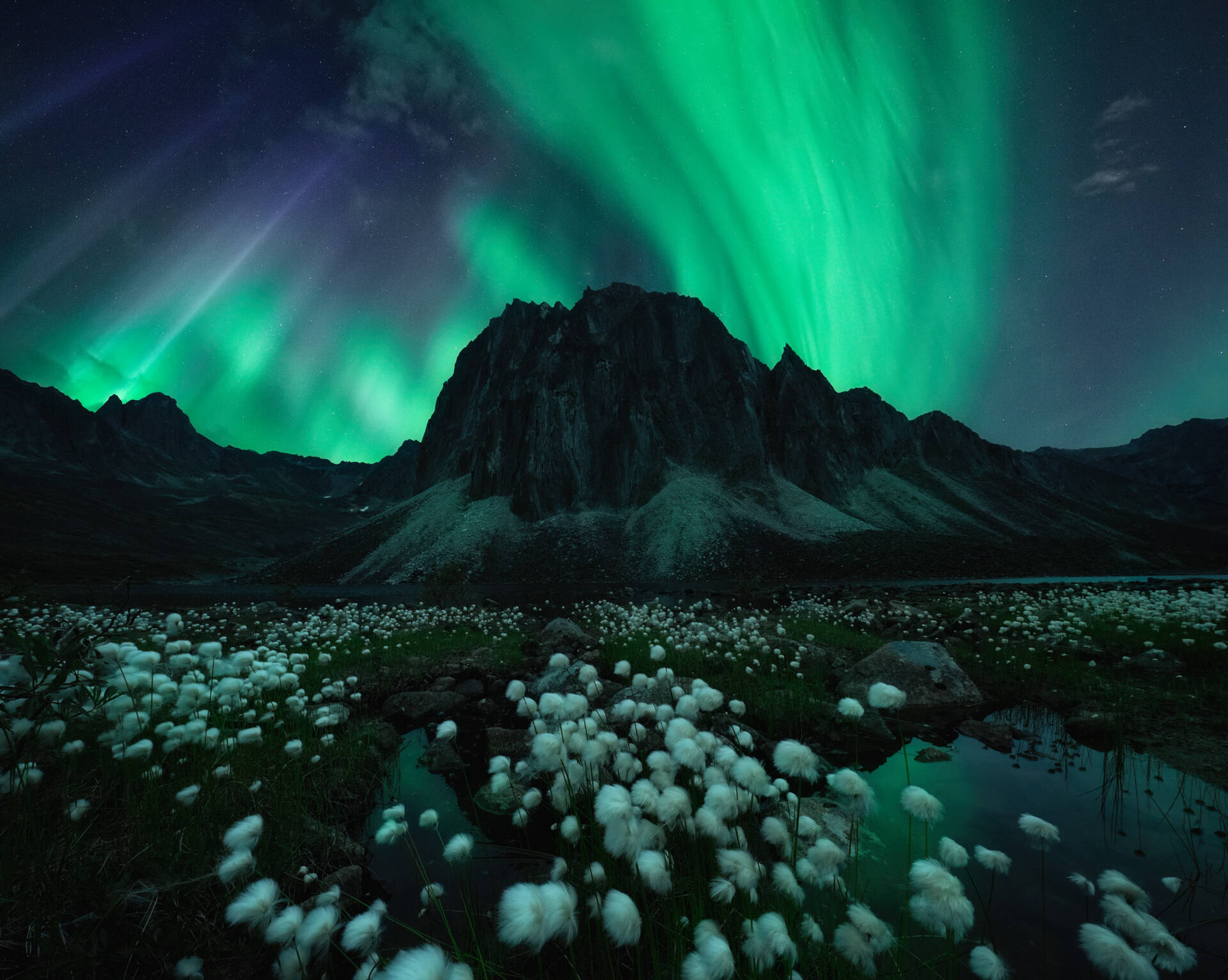
“Under a Northern Sky” – Rachel Jones Ross
- Tombstone Mountain Range, Yukon Territory, Canada
The northern sky is utterly fascinating.
We have all heard stories about the land of the Midnight Sun: in the summer, the sun doesn’t really set, and in the winter, nights are long with no sun, or very little sun at all. But there are also 3-4 days each month when the moon doesn’t set (circumpolar) and 3-4 days each month when it doesn’t rise!
Before I left, I checked the moon calendar, and I was a bit disappointed to see that my visit would coincide with a waxing gibbous approaching a full moon. But on closer investigation, there were four nights when the moon didn’t make it above the horizon, and I had dark nights for shooting the Aurora!
Foreground: f/2 1/60 seconds, ISO 3200
Sky: f/2.8, 1 second, ISO 3200
“Michigan Night Watch” – Marybeth Kiczenski
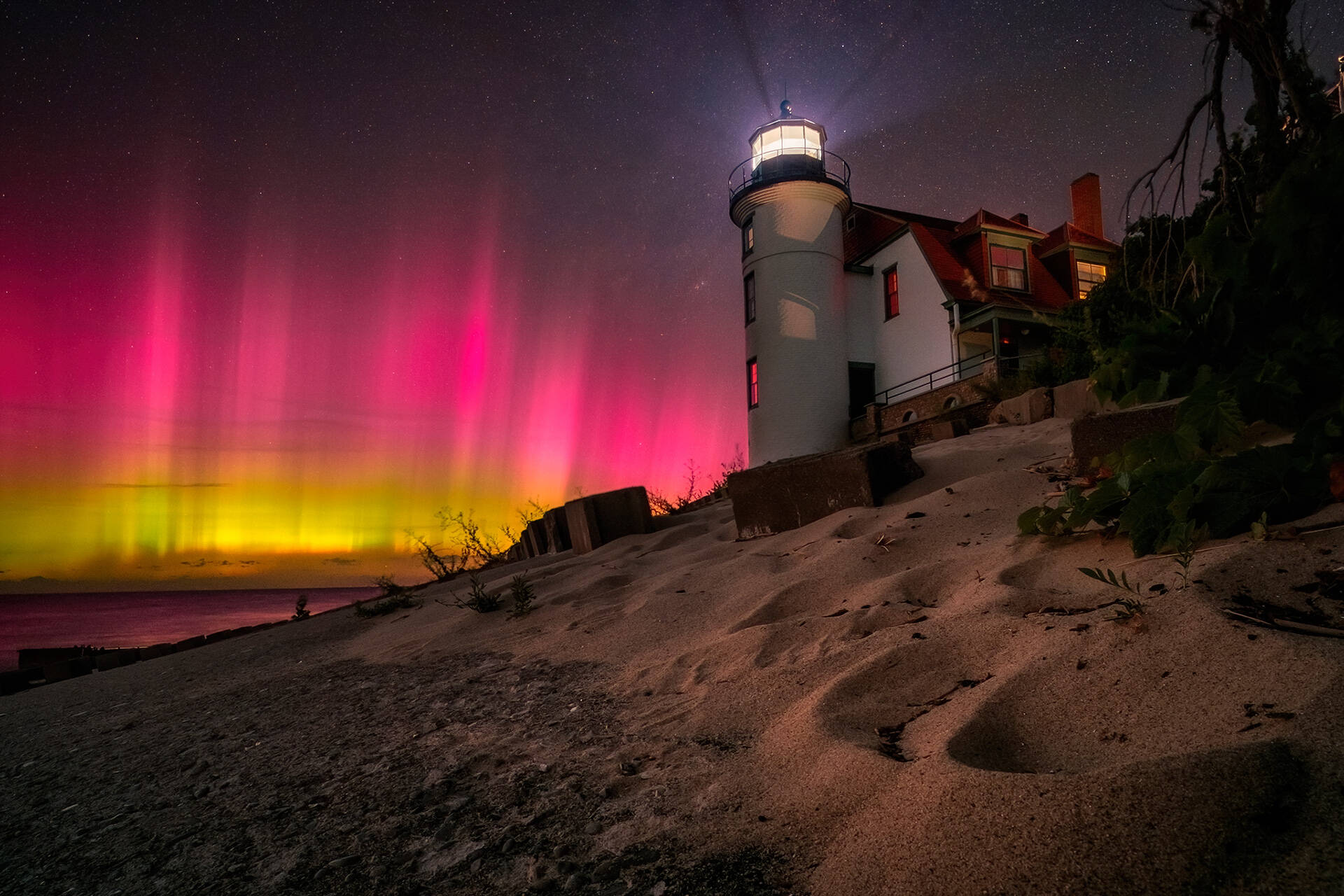
“Michigan Night Watch” – Marybeth Kiczenski
- Point Betsie Lighthouse, Frankfort, Michigan
Lady Aurora waits for no photographer or schedule. However, when I returned from Canada to Chicago, I was greeted by an Aurora forecast that was slated to be quite good (G1/G2 with a slight possibility of G3 conditions).
I decided to choose Point Betsie as my main location for this Aurora chase. I was greeted with quite heavy winds but a beautiful sunset and warm weather. It was super busy since it was a Friday, and there were good conditions for Auroras. It was fun to make some new friends, and we chatted while waiting for Lady Aurora to make an appearance.
Around 11:30pm, she made herself known. We cheered. We clapped. This is what makes all of it worth it! Afterward, we packed up and drove the three hours back to Martin, MI, to start work for the day. Ah, the life of an Aurora chaser!
Sky: ISO 3200, F/2, 4-seconds
Foreground: ISO 2000, F/7.1, 30-seconds. Focus stack.
- Nikon Z6 Astromodified
- Nikkor 20mm F/1.8S
- Slik USA Pro 500DX Tripod
“Nugget Point Lighthouse Aurora” – Douglas Thorne
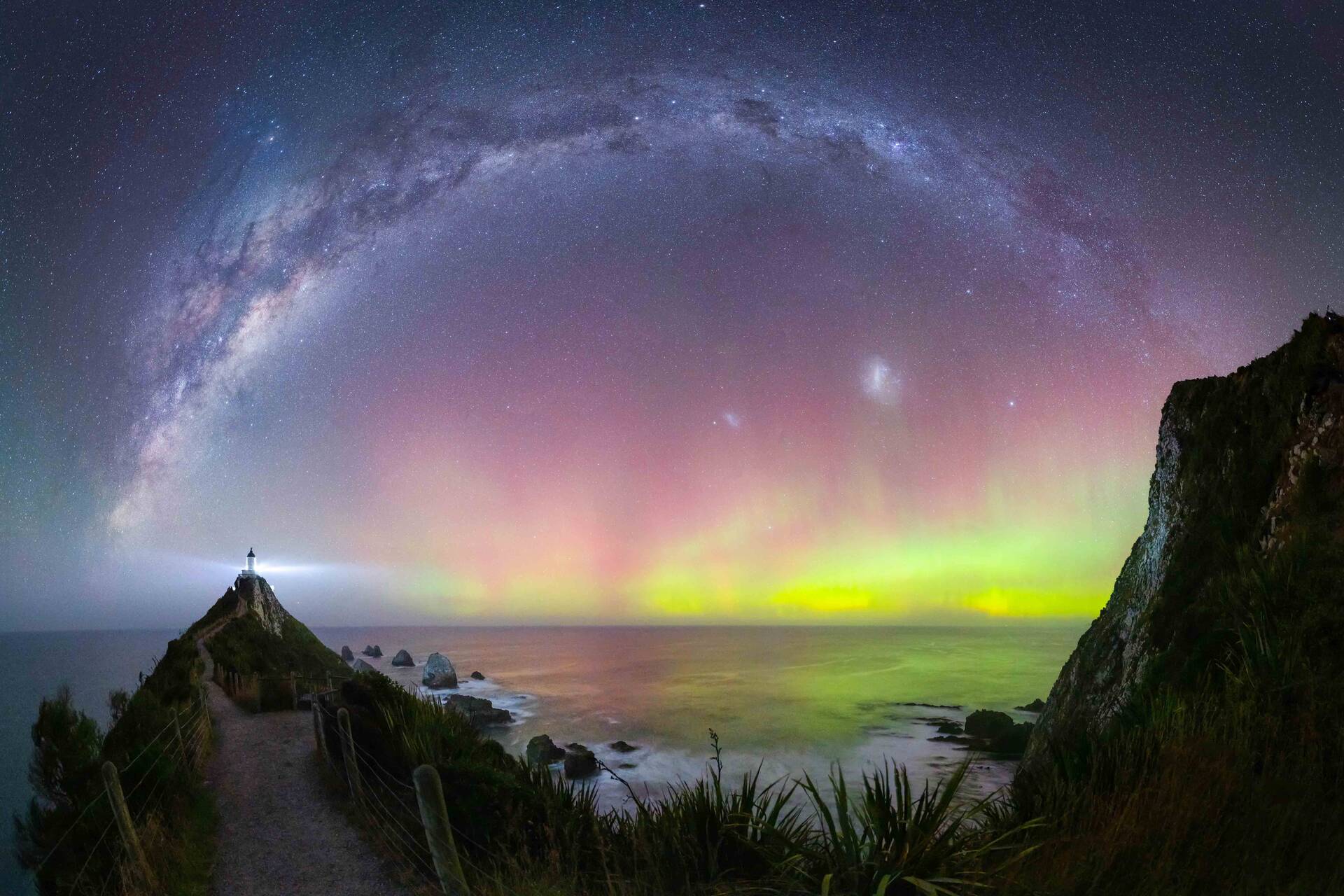
“Nugget Point Lighthouse Aurora” – Douglas Thorne
- Nugget Point Lighthouse, New Zealand
Nugget Point Lighthouse is on the eastern side of New Zealand’s South Island. It rests above the famous rocks, which were named by Captain Cook because they looked like pieces of gold. The lighthouse is set on a precipice, where the ocean meets the sky. From here, you can get panoramic views of the southern seas, so it’s a photographer’s dream location.
I arrived here early one autumn morning to capture the Milky Way rising above the lighthouse. It was an image that I’ve planned to capture for a long time. However, I was greeted by a surprise visitor. The Aurora Australis began to glow, its beams blooming over the ocean. I quickly changed my approach and got excited as flashes of yellow and red began to appear in my frame.
Eventually, the Milky Way and the Aurora began to synchronize harmoniously, resulting in this image. I love the leading lines and the way the Milky Way surrounds the Aurora. Mostly though, I love that this wasn’t the picture I planned. It reminds me that sometimes the best shots happen unexpectedly. You have to take risks and go exploring because you just never know what you might come across.
14 secs, f/3.5, ISO 6400, 16 images stitched.
“Towering Ice” – Virgil Reglioni
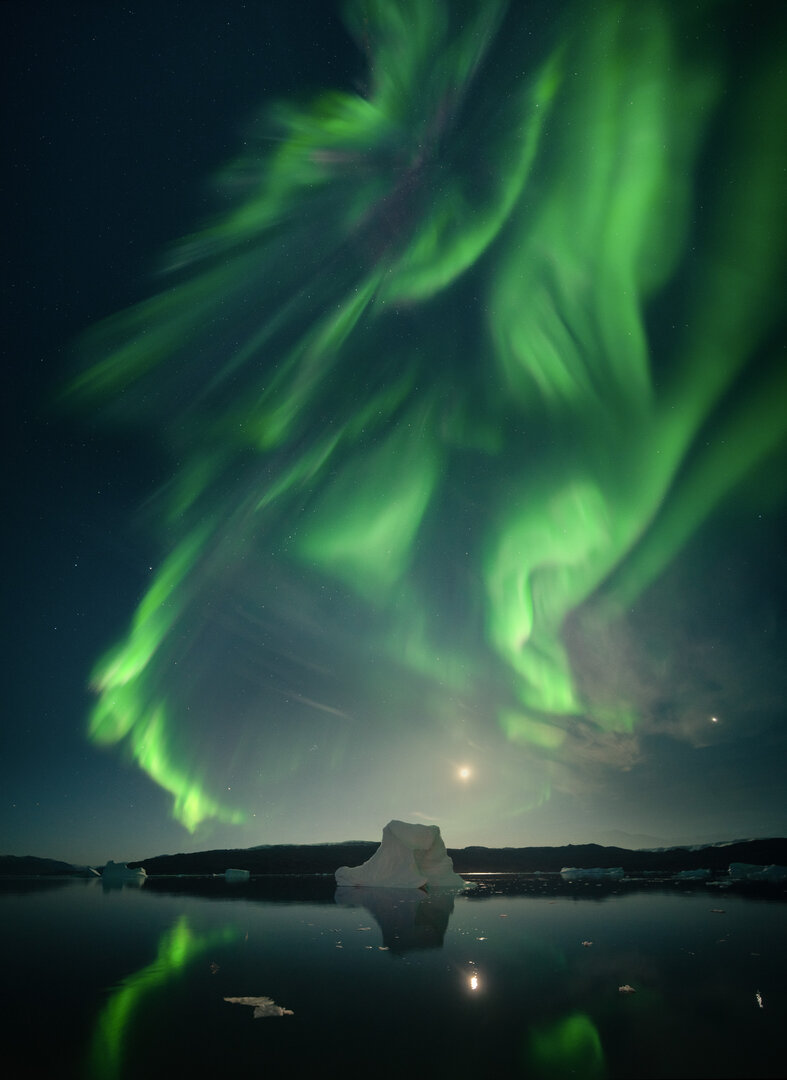
“Towering Ice” – Virgil Reglioni
- Scoresby Sund, East Greenland
At high latitudes such as 71° North on the eastern side of Greenland, the Aurora oval varies and slightly leans down. The Aurora is stronger here than at more southern latitudes due to the tilt of the magnetic north.
That night, the Aurora forecast predicted a KP 2 to 3, and with those conditions, it would have been easy to see the lights when looking north; however, we were facing southeast.
”Towering Ice” was captured from an icebreaker, meaning that the exposure time had to be quite short to avoid movement from the drifting and rocking vessel. The Aurora exploded above our heads, which also required a faster shutter speed, allowing me to freeze its movement.
Additionally, that night the full moon was shining light into the fjord, which was filled with giant icebergs.
15mm, ISO 1600, F/2.0, 1 sec – Vertical panorama of three images.
“Magical Forest” – Elena Ermolina
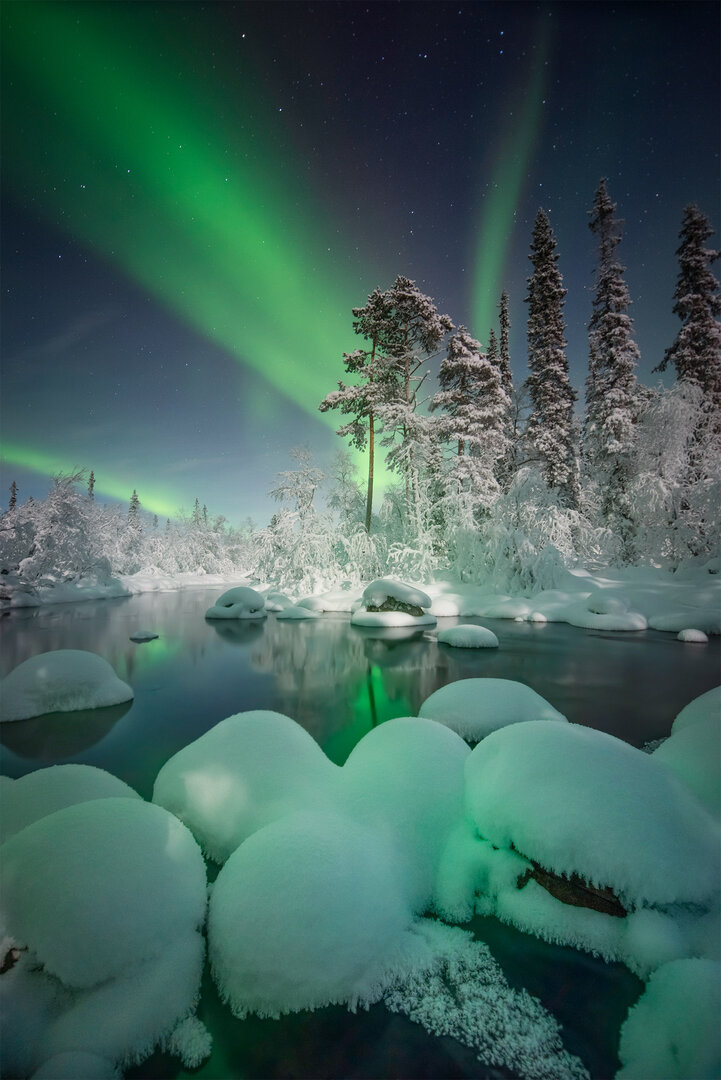
“Magical Forest” – Elena Ermolina
- Murmansk, Russia
Anyone who has been to Northern Russia knows that there is nothing more breathtaking than the Aurora Borealis. The sky is covered with a pale haze full of stars.
Slowly, from this light mist, the outline of an arc appeared, and its limits went beyond the horizon. A few moments later, long vertical beams shined along the arc, and everything around me was illuminated by an unearthly light.
Winter covered the forest with a blanket of snow, and the frost was severe. The light from the Aurora was incredibly beautiful but didn’t last long. The moon illuminated everything around me, and the shots turned out to be as bright as if I had taken them in the daytime, adding beauty to the picture.
F/2.8, ISO 1000, 15secs. Focus stacking 2 frames
- Nikon D810
- Nikon 14-24mm f/2.8
- Bexin tripod
“Inception” – Giulio Cobianchi
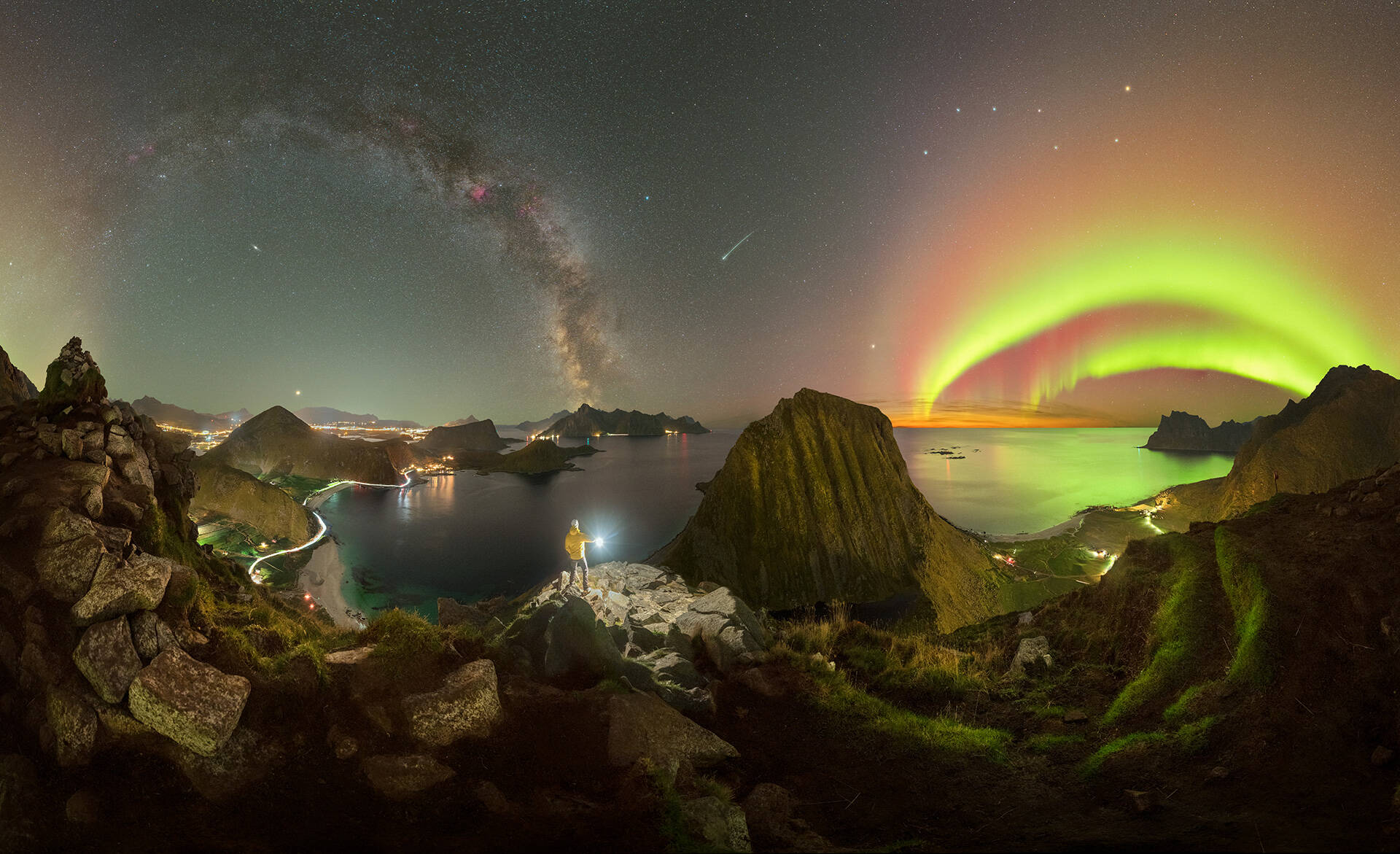
“Inception” – Giulio Cobianchi
- Lofoten Islands, Norway
These are the Arctic nights that leave you breathless!
I decided to spend that night up in the mountains with one of the most beautiful views of the Lofoten Islands. My goal was to photograph a “double Aurora & Milky Way arc”, to add to my Aurora collection. I had been planning this pano for a couple of years, and finally, all the elements aligned.
It wasn’t completely dark yet when I began to see the faint Milky Way in front of me. I hoped that in the next hour, a faint Aurora would appear on the opposite side, creating an arc that would fit perfectly into the composition, and so it was! What a night!
Under the Milky Way, you can see the Andromeda Galaxy in the middle of the two arcs. A shooting star acts as the cherry on top, and above a colorful Aurora, there is one of the most beautiful constellations, the Big Dipper! To the north, you can still see the light of the sun, which had recently gone below the horizon.
Sky: 10 shots, 14mm, f/2.8, 15 sec, 6400 ISO
Foreground: 10 shots, 14mm, f/4, 60 sec, 4000 ISO
Model: 1 shot, 14mm, f/3.2, 10 sec, 8000 ISO
- Nikon Z6II astromodified
- Sigma 14-24 f2.8 Art
- Feisol Tournament CT-3442
“Spirits of Winter” – Unai Larraya
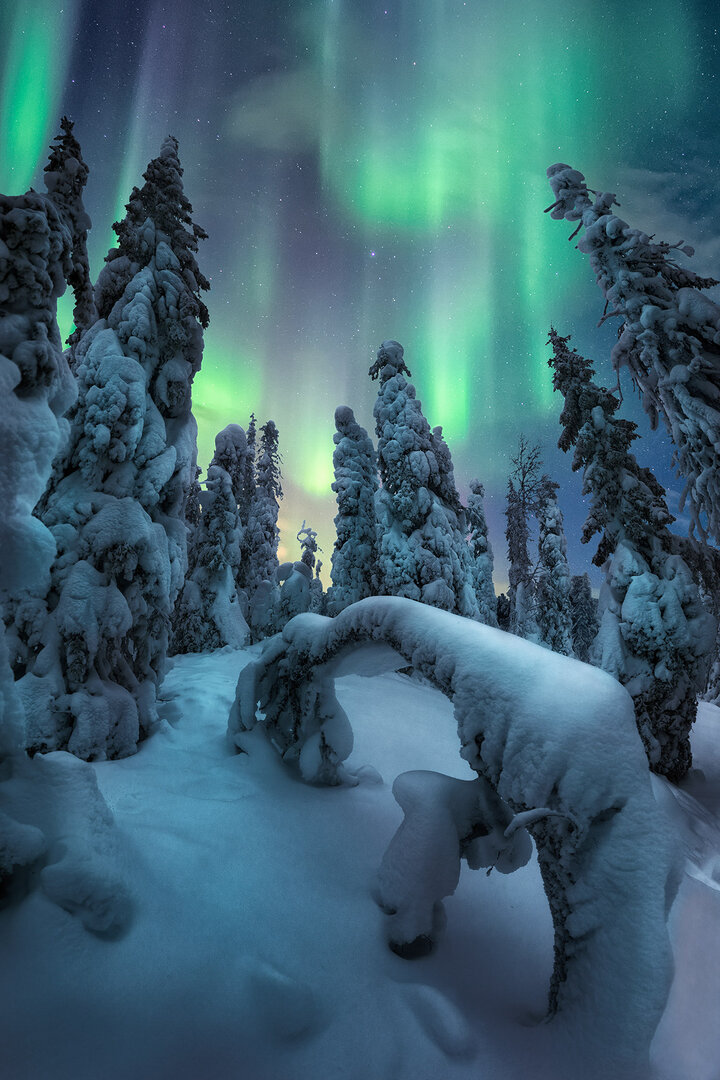
“Spirits of Winter” – Unai Larraya
- Riisitunturi National Park, Finnish Lapland
This year, I took a trip to the Finnish Lapland with the goal of capturing the elusive Northern Lights. However, the first few days in Kuusamo, where I stayed, were a bit disappointing due to the terrible weather conditions.
Day 3 looked promising with a KP6 and clear skies for the whole night. However, after being out all night, we didn’t see a single light, which was unusual.
The Aurora forecast for the next day didn’t look good, and the weather forecast showed that there would be some clouds. However, we wanted to photograph the Northern Lights so badly that even with an unpromising forecast and temperatures of -30ºC, we decided to give it a try. Finally, the magic happened, and I was able to photograph the Aurora Borealis! I was so happy to finally photograph the Northern Lights that I didn’t care about the cold; I just had a great time with my friends!
Foreground: 5 photo vertical panorama. 30 sec, f/5.6, ISO 3200
Sky: 6 sec, f2.8, ISO 1250.
“An Explosion of Color” – Vincent Beudez
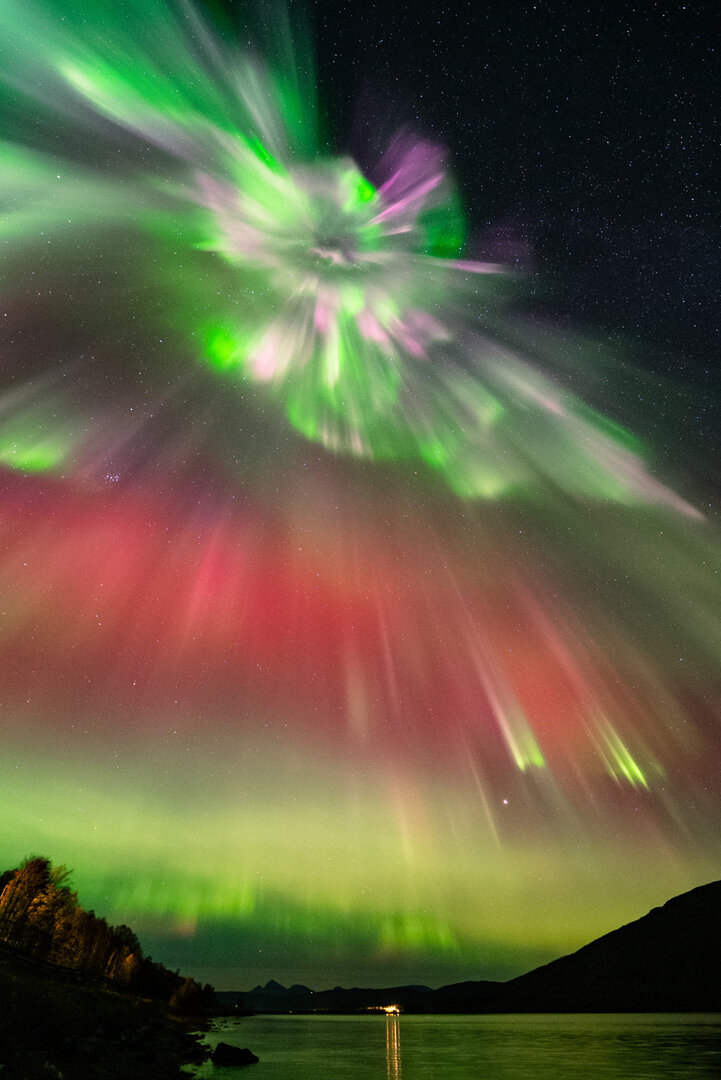
“An Explosion of Color” – Vincent Beudez
- Tromsø, Norway
On this night, the Aurora forecast was very promising, but I was not expecting anything like this. It was cloudy all over Senja, where I was staying, so I had to drive a few hours to escape the clouds.
It was a really beautiful night, and I saw some “coronas” and Northern Lights to the south. However, what happened at 3am was totally unexpected. A huge red Aurora traveled across the southern sky (visible with the naked eye), while a spectacular Aurora exploded just above my head.
This was by far the most colorful night I’ve ever witnessed up there, and it was a rare event that I’m very grateful to have been able to see.
F/1.8, 1 sec, ISO 6400, 14mm
“The Light Upon Kerlaugar” – Jannes Krause
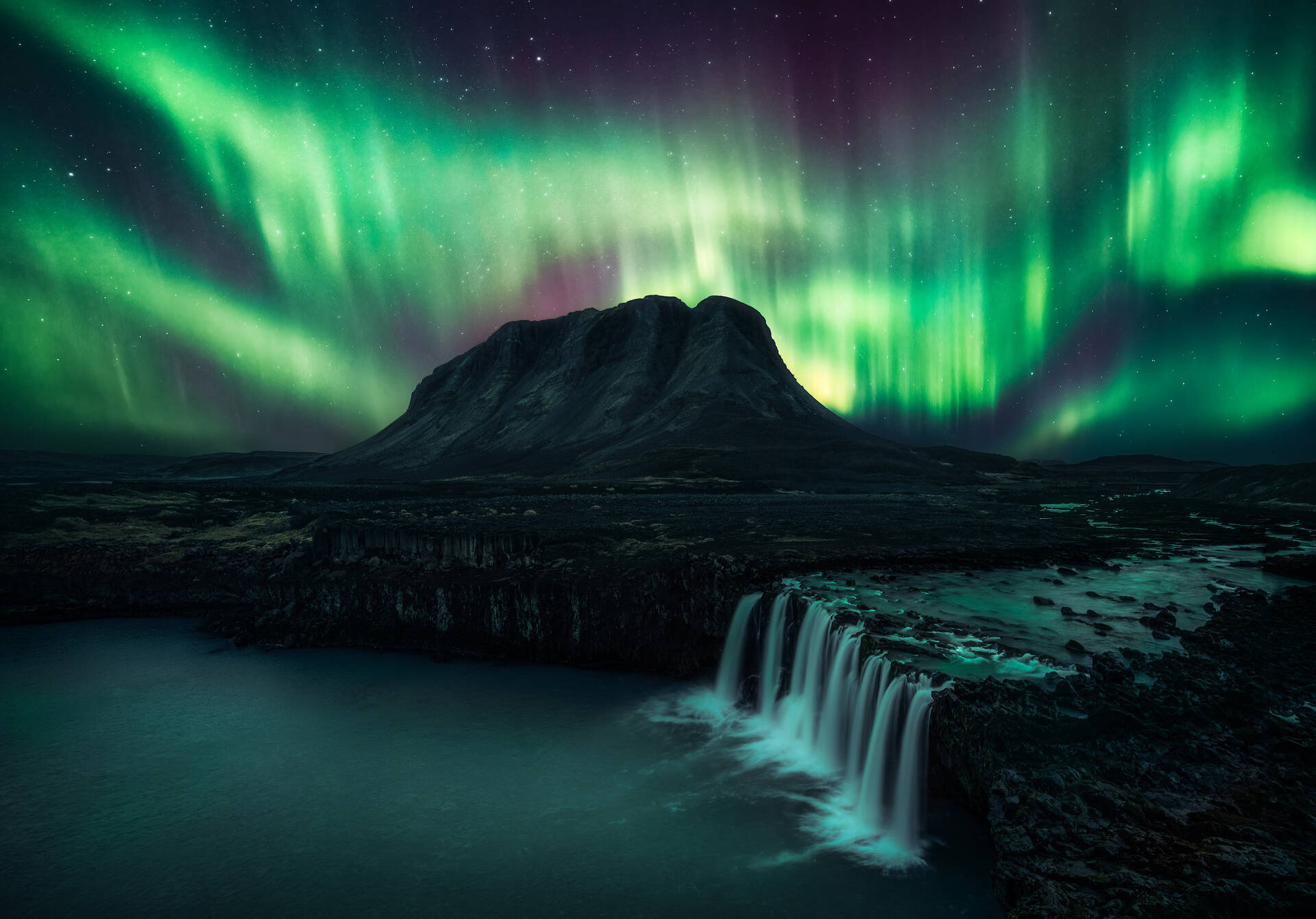
“The Light Upon Kerlaugar” – Jannes Krause
- Suðurland, Iceland
I was lucky enough to witness a fantastic KP 8 display on my trip to Iceland back in October. Not only that, but it was also my first time experiencing and photographing the Northern Lights.
Originally my flight back home was scheduled to depart about 12 hours before this intense solar storm, but as soon as I saw the perfect weather and Aurora projections, I knew that I just had to change my plans and extend my trip by an additional day. Things finally came together, and I couldn’t be more pleased with the images I got.
Sky: f/4, ISO 6400, 5 sec
Foreground: f/5.6, ISO 1600, 25 sec
“Explosions of the Sky” – Kavan Chay
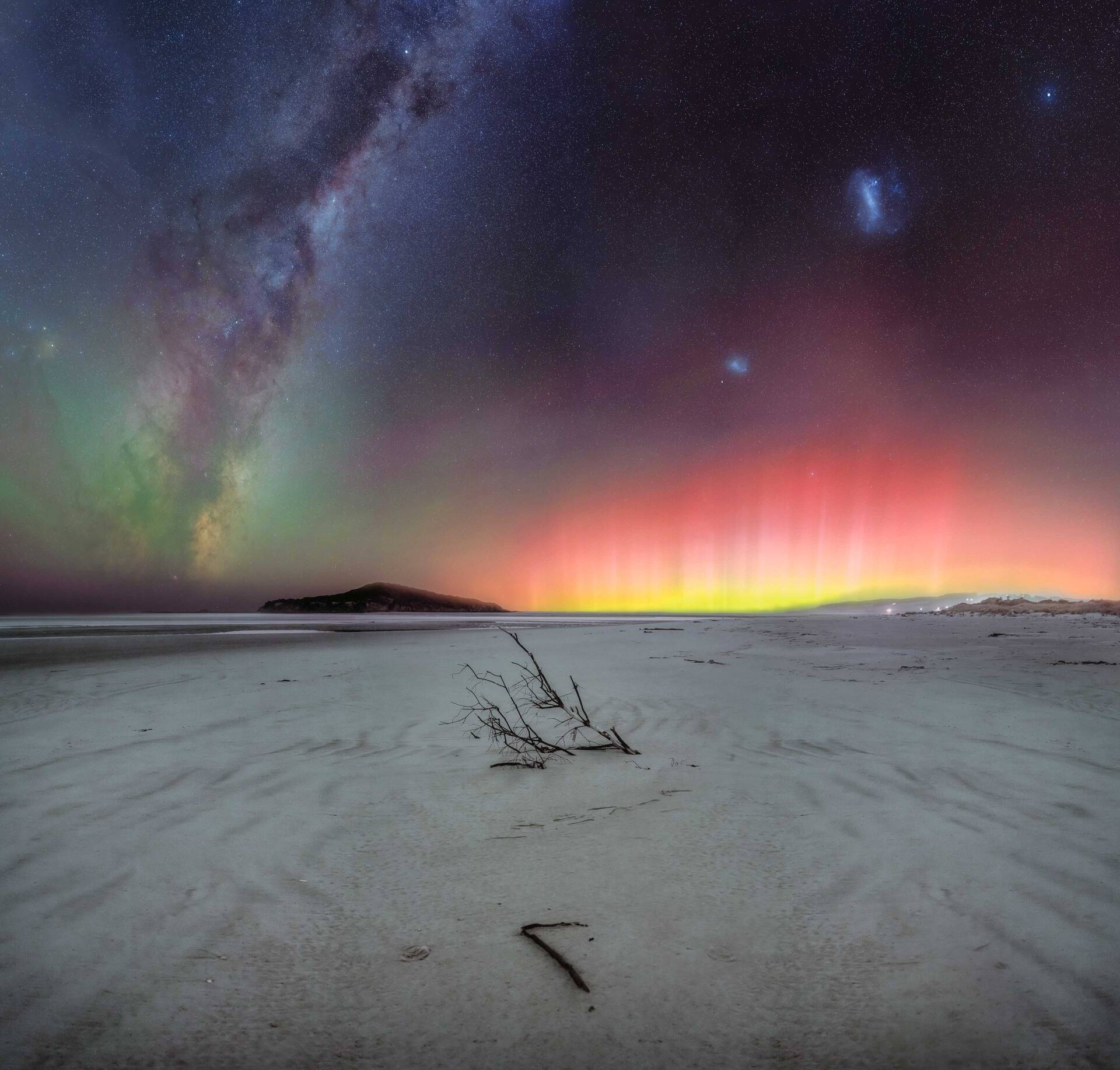
“Explosions of the Sky” – Kavan Chay
- Taiari Beach, Otago, New Zealand
New Zealand is really a special place for astrophotography. The skies are beautifully dark, and there are so many interesting landscape features to take in. Despite this, I’ve never managed to capture an Aurora shot with an interesting foreground element prior to this moment.
Unfortunately, the Aurora activity is not as consistent compared to other forms of astrophotography, so I had to be patient.
It was a cold night when the alerts and posts from other excited Aurora chasers popped up online. I sent a quick message to a few friends and went out to this spot. I ended up spending some time here with a friend as the lights put on a show, but the display kicked it up a notch once he left. With the whole beach to myself, no pesky lights from other people or cars, the perfect weather and strong beams… I really couldn’t have asked for anything better.
It’s this exact shot that made me addicted to chasing Auroras, and I’ve had the privilege of enjoying this sight many more times since then, with hopefully more of these moments to come.
Sky: Panorama made up of 11 tracked shots. Each shot at ISO1600, f/2.8, 15 secs.
Foreground: 2 row x 3 shot panorama. Each shot at ISO6400, f/6.3, 150 secs.
“Chasing the Light” – David Erichsen
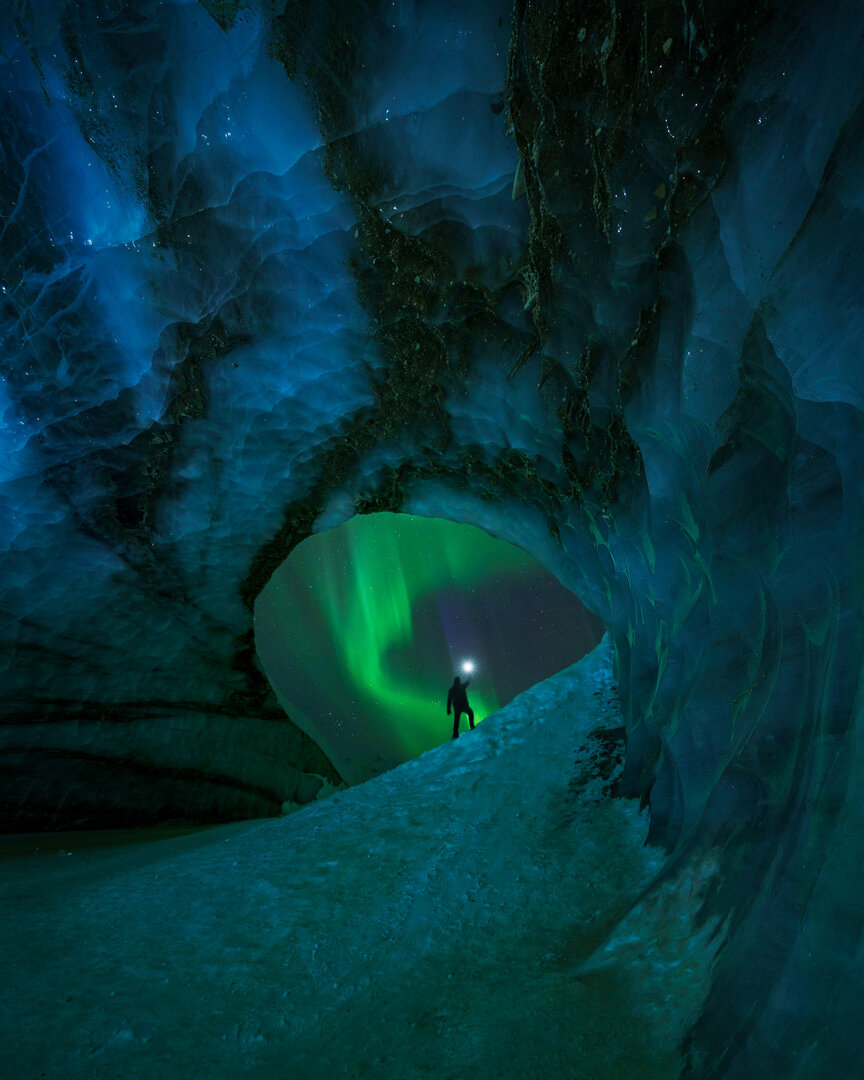
“Chasing the Light” – David Erichsen
- Castner Glacier, Alaska, USA
As a kid growing up, chasing the Northern Lights had always been a mystical dream. Even though I’ve been lucky enough to witness quite a few shows over the last few years, it never gets old.
What’s not pictured in this shot are the several nights I wandered out to this cave in sub-zero temperatures waiting for just a hint of green to dance through this frozen window. After repeatedly striking out, I finally got another opportunity on a night following a huge G2 with clear skies.
I knew the recent CME (coronal mass ejection) might be strong enough to make this 2-hour midnight hike worth the journey. As I made my way out to the cave, my walk quickly became a full-on run as I saw the sky split open with magnificent color. Sadly, the ice cave collapsed on itself a couple months ago, which just shows that you have to chase every opportunity before it’s gone.
Sky: 2.5 sec, f/2.8, ISO 500
Foreground: 25 sec, f/3.2, ISO 1000
- Sony A7RIII
- Sony 12-24GM
- Peak Design Carbon Fiber Tripod
- Lume Cubes (used to lighten up the cave)
“Captain Hook” – Mattia Frenguelli
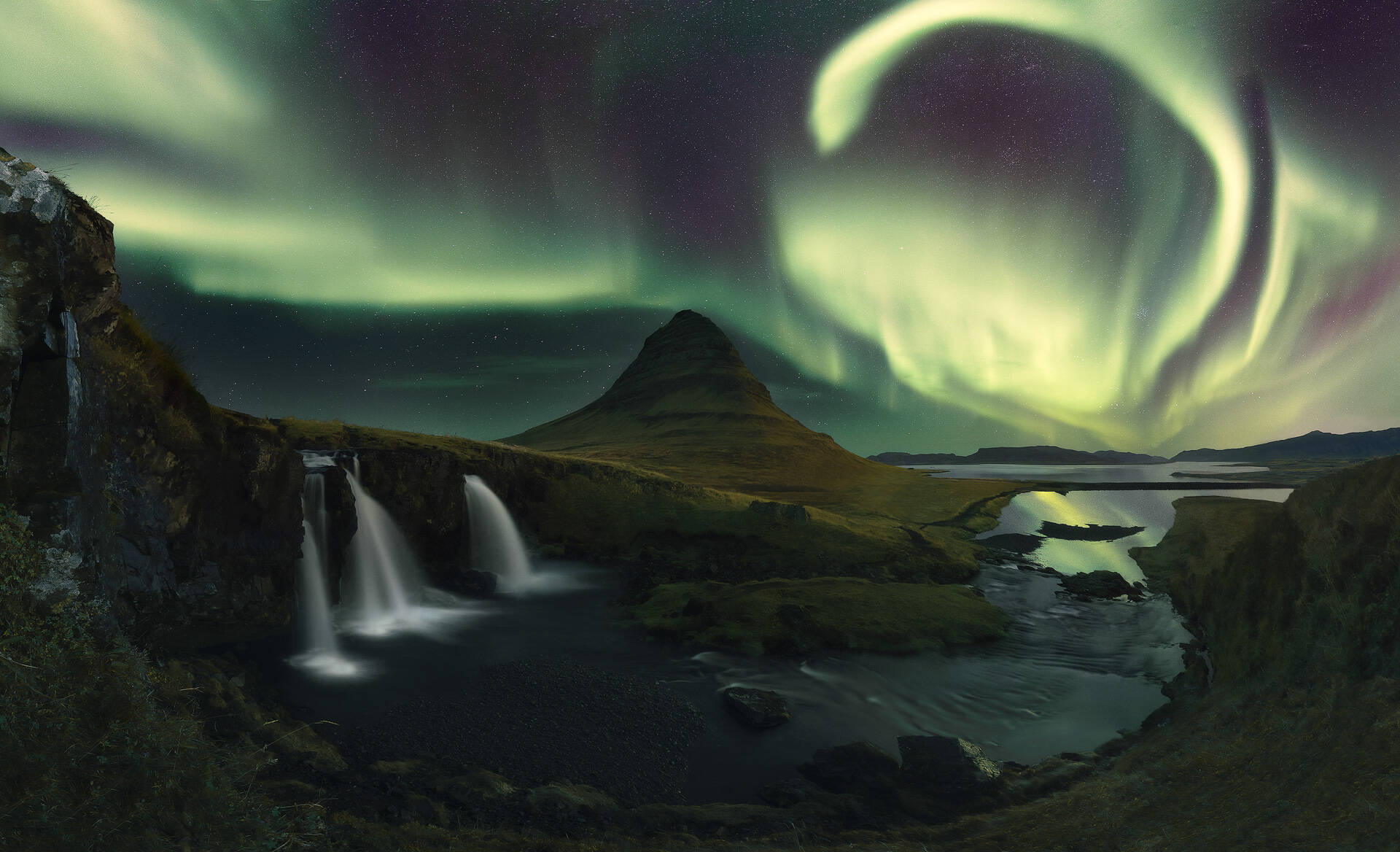
“Captain Hook” – Mattia Frenguelli
- Kirkjufell, Iceland
October 11, 2021.
This day will probably remain etched in my memory forever.
It’s difficult to explain with words since to fully understand it you had to be there. To take this photo, I had to stay focused while contemplating this immense spectacle of nature, trying to stay as calm as possible despite my strong emotions.
Unexpectedly, this was one of the most prominent displays of the Northern Lights in recent years, with a KP 6.33. This powerful solar explosion caused blackouts across India, (as the newspapers reported the following day), but paved the way for this beautiful light show.
Panoramic from 5 vertical photos. 16mm, f/2.8 3sec, ISO 5000
“Red Skies” – Ruslan Merzlyakov
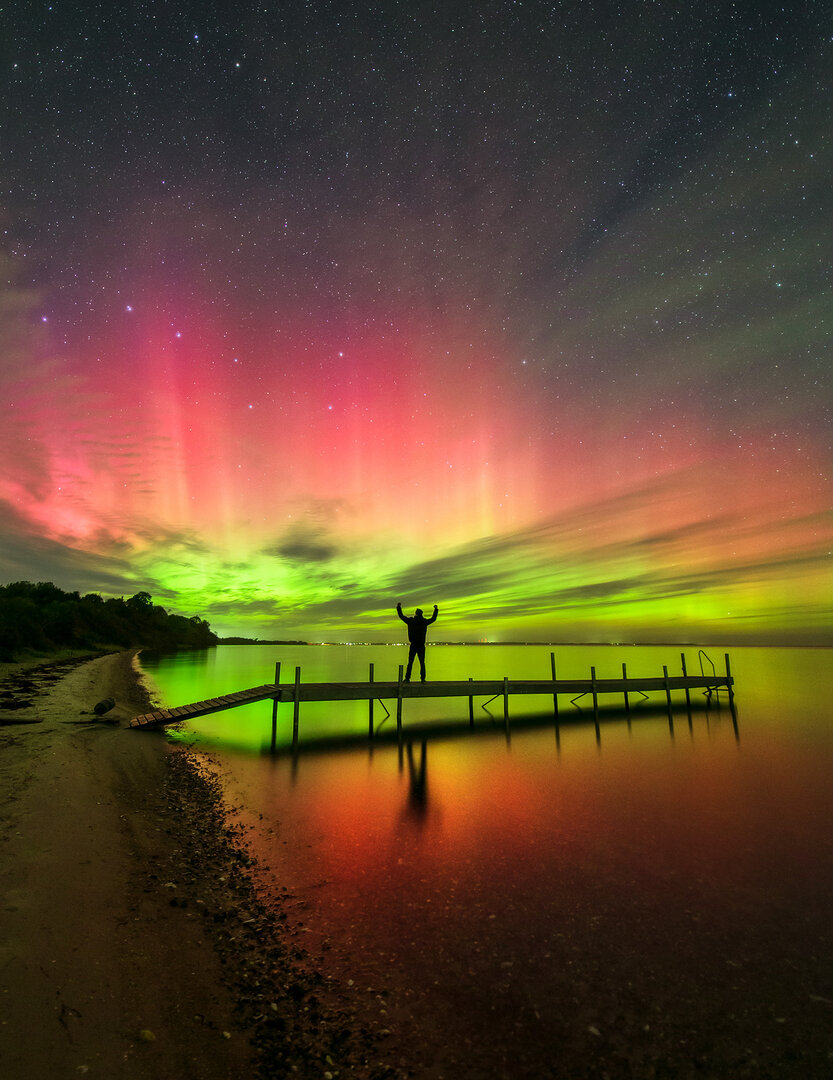
“Red Skies” – Ruslan Merzlyakov
- Nykøbing Mors, Denmark
Absolutely insane red pillars of the Aurora showed up above Limfjord, just a 3-minute drive from my house.
Many think that Denmark, being placed far away from the general Northern Lights activity, is not an ideal place to see the Aurora. This might be true, but there is always hope for magic during the darkest months of the year.
I have been photographing the night sky for more than 10 years, and I always try to inspire people to go outside to experience our wonderful night skies and explore the unknown.
The happiness you feel when watching the sky glow like this in your hometown is unforgettable.
10sec, f/1.8, ISO 1600
- Canon EOS 6D astromodified
- Sigma 14mm f/1.8
- Manfrotto tripod
“The Fjord Guardian” – Filip Hrebenda
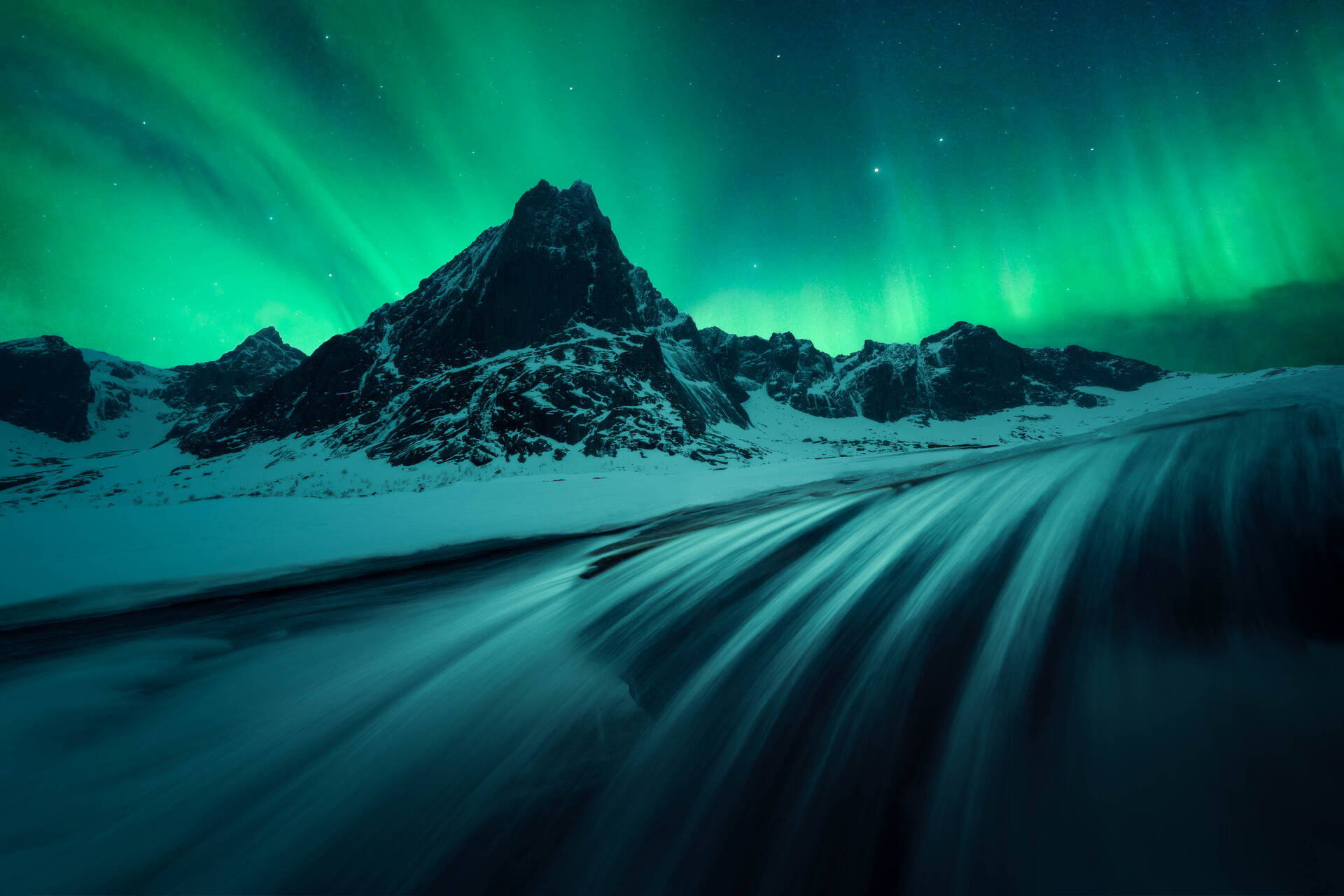
“The Fjord Guardian” – Filip Hrebenda
- Lofoten Islands, Norway
I took this photo last winter on the Lofoten Islands in Norway. I was supposed to fly home that day, but due to the heavy snowfall and avalanches on the road, I couldn’t get to the airport. I had to stay a few extra days in the area, so I used that time to explore and capture this photo.
It was a really cold night, but that didn’t deter me. Forecasts were reporting KP5 values, which would mean a bright Aurora if there were clear skies. At first, it was cloudy, but after a while, it cleared up and the Northern Lights appeared between the clouds. What a great night it was! It was worth staying there for a few more days.
ISO 2500, 2,5 secs, f/2.8
“Magic Night” – Anastasia & Aleksei R.
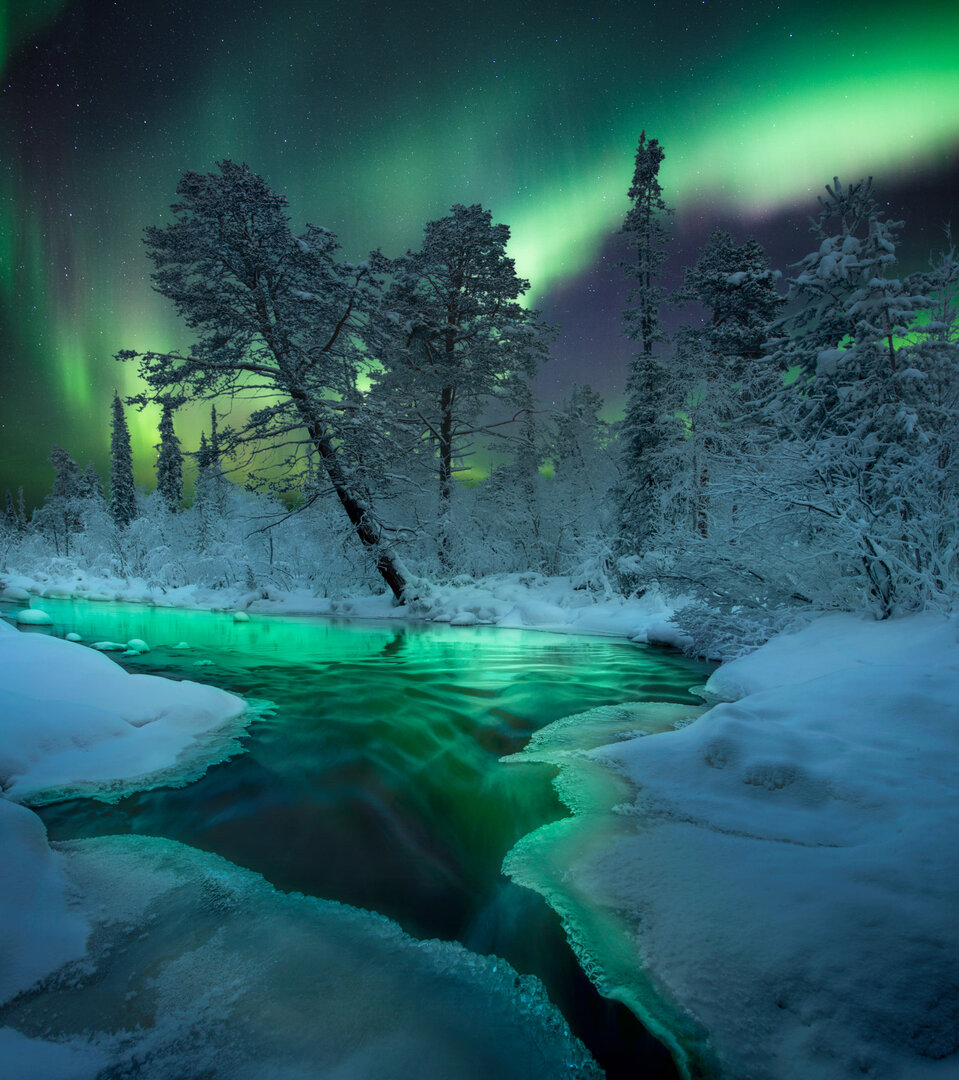
“Magic NIght” – Anastasia & Aleksey R.
- Kola Peninsula, Russia
There aren’t many events that are as moving as seeing the Aurora Borealis illuminate the night sky in a dance of mesmerizing movements and vibrant colors.
I took this image on the Kola Peninsula. The beautiful thing about this area is that most rivers don’t freeze. Wandering around winter rivers coated in rime ice is one of the most magical experiences but also one of the most difficult to capture.
Temperatures often drop below -30ºC, and moving through the fragile snow with snowshoes and a headlamp makes for a great challenge in hiking and composing images.
Foreground: f/4, 20s, ISO 1600. Two shot focus stack.
Sky: f/2,8, 2s, ISO 3200
- Nikon Z6 II
- Nikkor Z 14-24mm f/2.8 S
- Manfrotto tripod
“Emerald Howl” – Itai Monnickendam
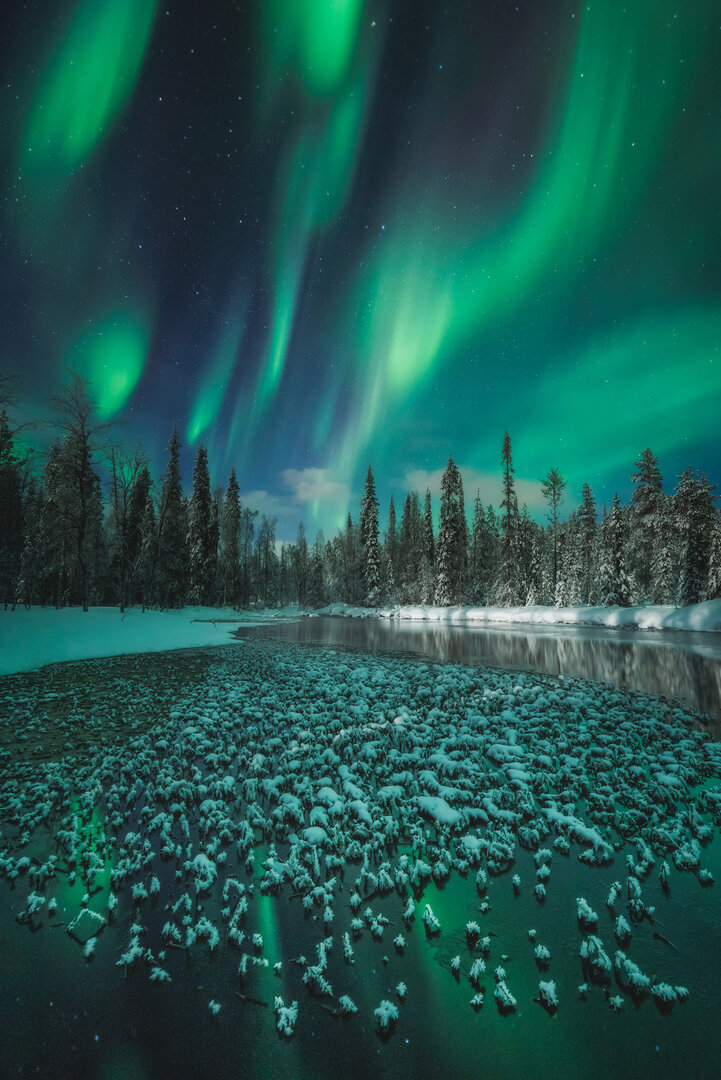
“Emerald Howl” – Itai Monnickendam
- Kolari, North Finland
The Northern Lights are amazing. Seeing them is an experience I wish everyone could have, and it’s a great pleasure bringing a friend to witness it for the first time.
However, in photography, it’s a bit different. The lights, amazing as they can be, can’t stand on their own and must be a part of a strong composition that tells the story of the place, the time, and the experience.
That’s why I was so happy that everything converged nicely that moonlit night. An amazing show in the sky, a unique and less familiar location I found when preparing for the trip, and a wonderful group that encouraged me to stay out for a few more hours after a long day. Without a doubt, it was a night to remember!
F/2.8, 12 sec, ISO 2500, 15mm
“Northern Lights over Dramatic Lofoten Peaks” – David Haring
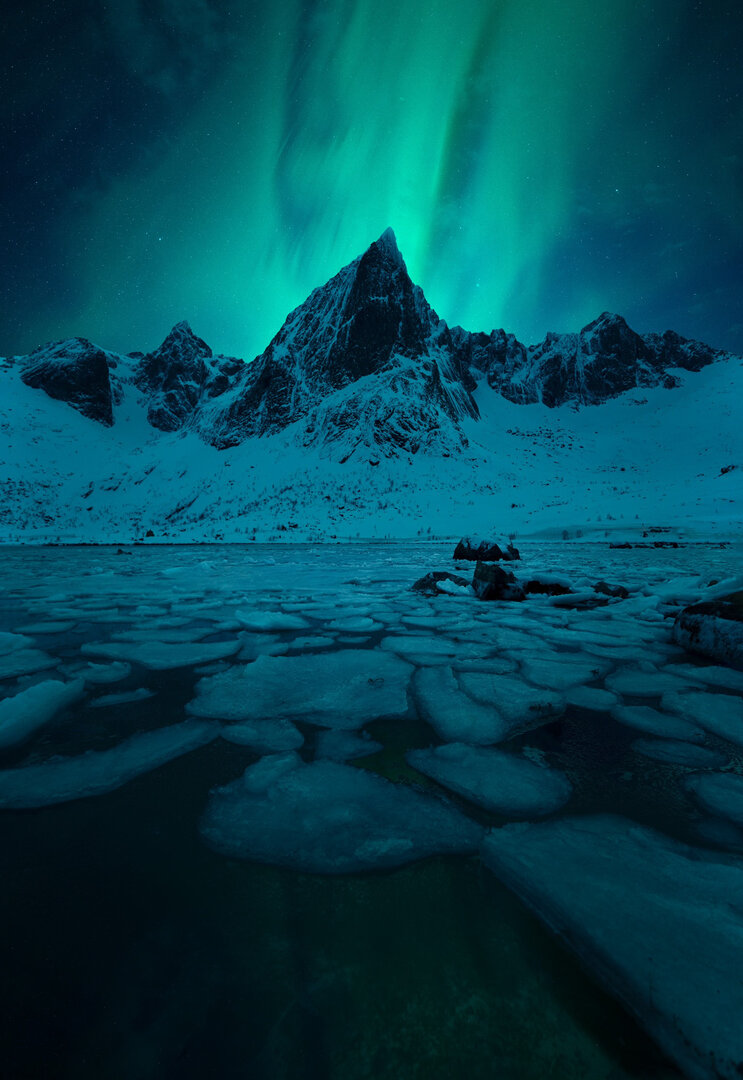
“Northern Lights over Dramatic Lofoten Peaks” – David Haring
- Lofoten Islands, Norway
This photo is clear proof that the best things come when you least expect them.
It had been a cold night, and the Aurora forecast predicted low activity, so I didn’t believe it would appear. But, on the other hand, the sky was clear, so I gave it a try and went Aurora hunting.
After hours of patience, a beautifully ethereal symphony took over the sky above the peaks of the Lofoten Islands. This was such a unique and unpredictable moment that I will remember forever.
ISO 3200, F/1.8, 3.2s
“Green Balls” – Jose D. Riquelme
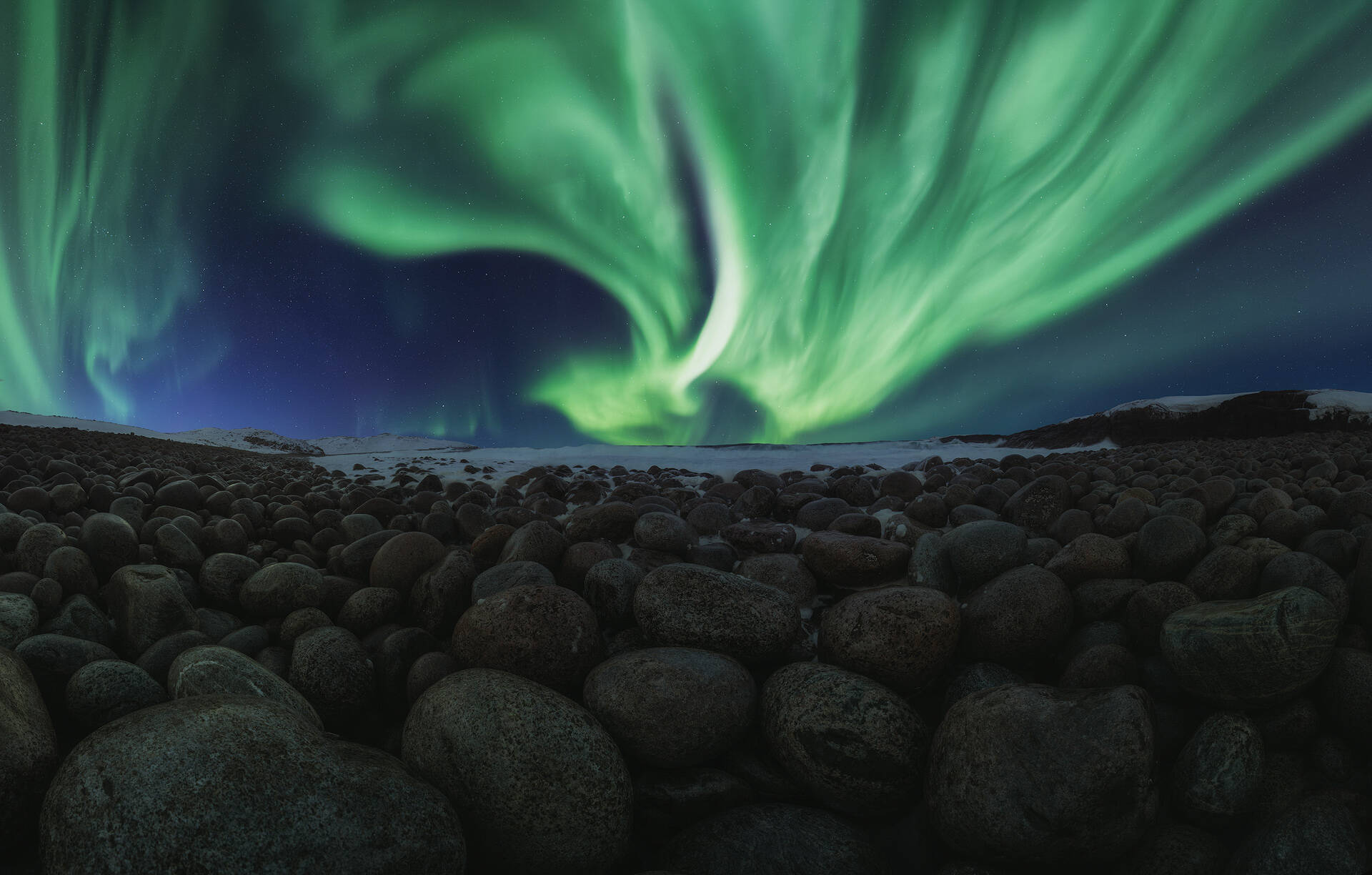
“Green Balls” – Jose D. Riquelme
- Teriberka, Russia
Last February, I took a trip to explore Northern Russia. The place was very inhospitable, but we had some spectacular encounters with the “Green Lady”.
I took this image in Teriberka at about -30ºC. At these temperatures, you can only leave your tripod in one position because it will freeze, and you won’t be able to get it up or down, and therein laid the challenge of finding the perfect composition.
ISO 3000, 14mm, 1.8, 4 sec
“Queen of the North” – Pierpaolo Salvatore
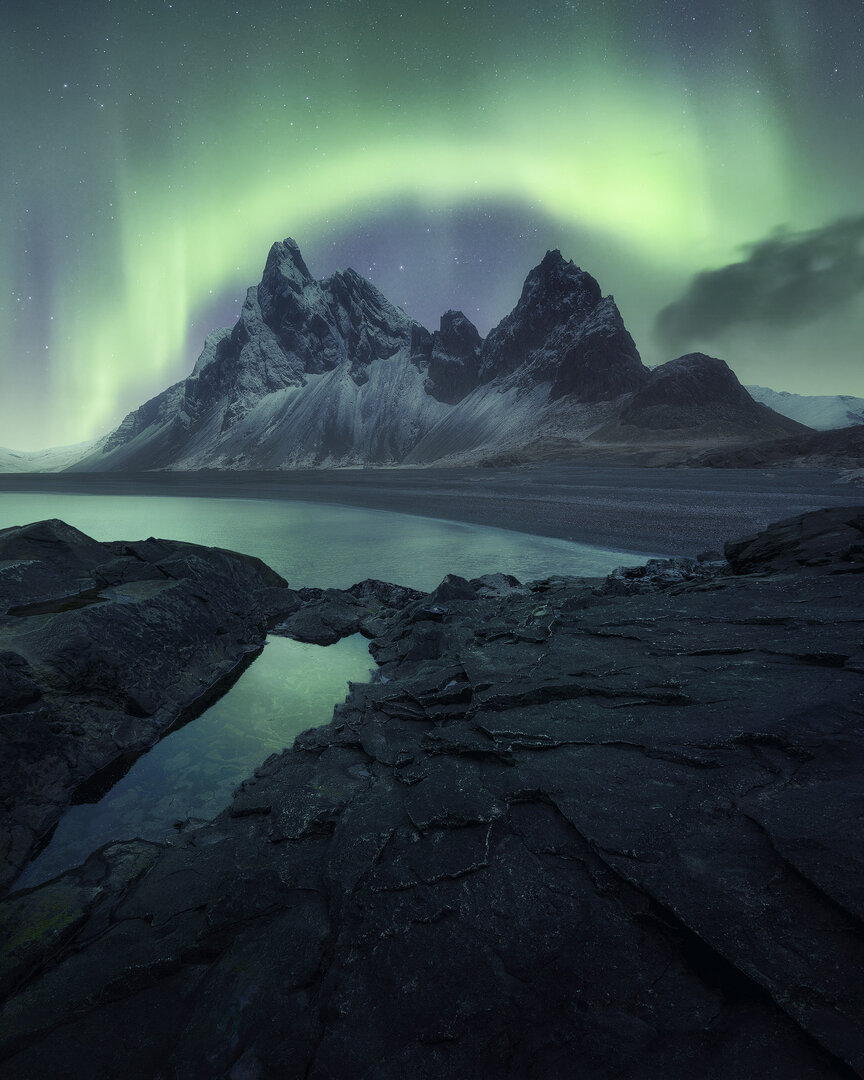
“Queen of the North” – Pierpaolo Salvatore
- Iceland
Seeing the Northern Lights dance above one of the most beautiful mountains in Iceland is a difficult experience to put into words. Imagine the wind in your face, the smell of the sea, and the sound of the waves on the rocks while the Queen of the North dances in the sky.
I love nature in all its forms precisely because it offers moments like this.
Sky: ISO 6400, f/2.8, 5 sec
Foreground: ISO 3200, f/2.8, 60 sec
“Lena Pettersen” – Reflections on the Ice
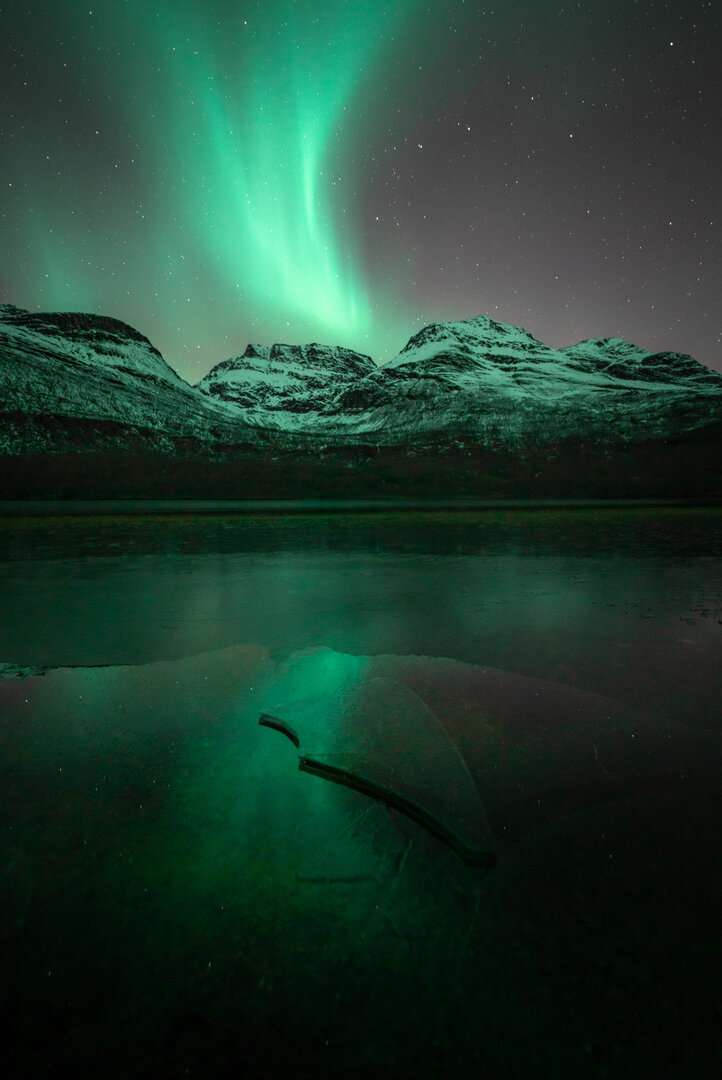
“Reflections on the Ice” – Lena Pettersen
- Troms, Northern Norway
It was a pretty dark night. A friend and I went into the forest to photograph the beautiful mountains covered in snow and hunt for the Northern Lights. The lake, which was also our subject, had started to freeze and had some thin ice.
I used the ice in the foreground to create better framing, and It turned out beautifully. The lights were not that spectacular that night, but I believe the picture came out with a great balance. I love the Northern Lights, and during the fall and winter seasons, I go out as often as I can to chase the Aurora.
14 mm, ISO 2500, f/1.8, 5 sec
“Bridge to Dreams” – Jabi Sanz
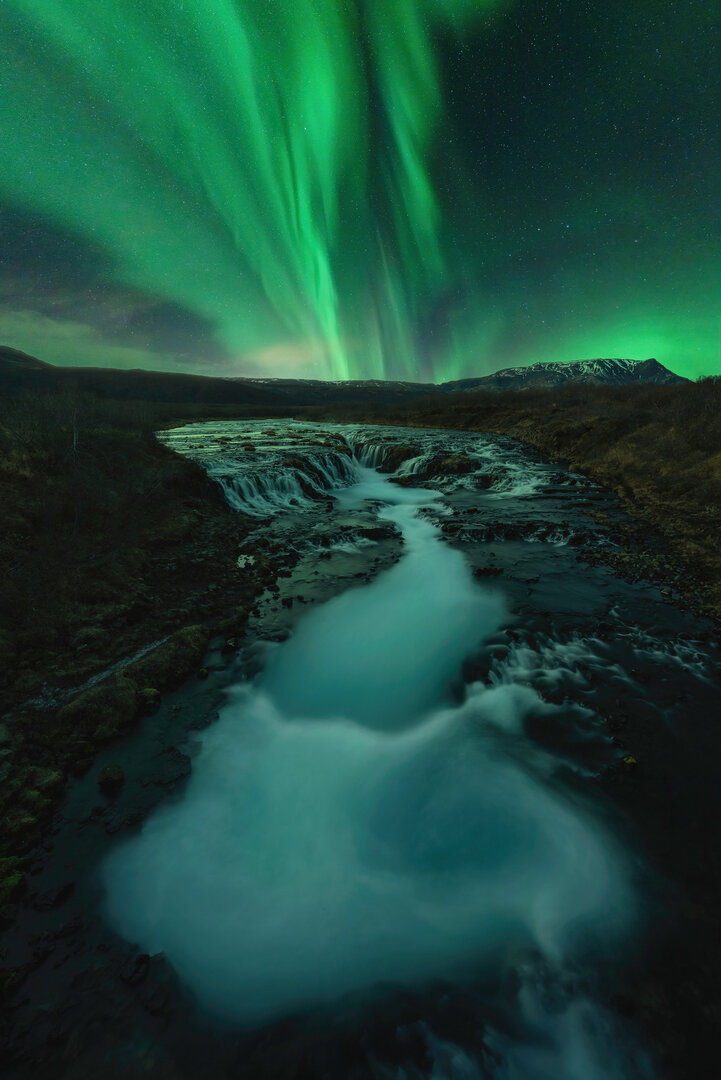
“Bridge to Dreams” – Jabi Sanz
- Brúarfoss, Iceland
This is one of the most magical experiences I had on my last visit to Iceland.
I would also like to say that it was not easy at all. I took this picture the first day I arrived after a very long trip from Thailand. Of course, my goal was to chase the Green Lady during this trip, but I went to this location with the idea of photographing the sunset and then getting back to the hotel to rest.
Getting to this location doesn’t require a long hike. It’s about a 6km walk round-trip, but it can get very muddy. I didn’t want to be out too late, as I was alone and had to go back to Reykjavik to sleep. I decided to check the weather and the Aurora forecast, and it looked promising for that area, so I decided to stay, even though it was freezing, and I didn’t come prepared to stay until nightfall.
When it got dark and I started to see the Green Lady dancing above me, I forgot about the cold and the hike back. It was a magical and epic moment, as one of my dreams had become a reality!
F/2.8 ISO 6400 2.5 sec. Single exposure.
I hope you found these images inspiring and that they encourage you to go out and have incredible adventures shooting the Northern Lights.
If you’re interested in shooting the aurora, some technical knowledge is key, and the best way to prepare your shots is by downloading our Northern Lights photography guide, which will help you figure out the best way to capture the “green lady.”
GET YOUR FREE EBOOK!
– PHOTOGRAPHING THE NORTHERN LIGHTS –
BEST SETTINGS, GEAR, PLANNING, TIPS, AND MORE!
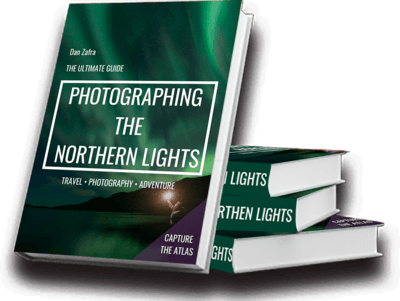
Also, don’t forget that camera gear for shooting the Aurora and the best settings in Northern Lights photography are important.
Thank you for sharing this article with others who might find it inspiring.
Below is a gallery with all the images at their full size. Enjoy it!
Please do not download, copy or share any of the photos here without the author’s prior written permission. Consider the photos here to be protected by copyright. If anyone uses any of the photographs we will take the required legal actions.
